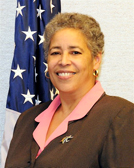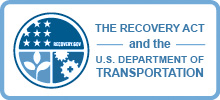Camille M. Hazeur
 Camille M. Hazeur, an experienced professional with an impressive record of accomplishment regarding issues of equity and diversity, was appointed Director, Departmental Office of Civil Rights, Office of the Secretary, U. S. Department of Transportation in October 2009. In this capacity, Camille is the designated advisor to the Secretary of Transportation on civil rights matters. In addition, she provides leadership, policy, guidance, monitoring, and technical assistance to the Department’s Heads of Operating Administrations in implementing departmental civil rights responsibilities.
Camille M. Hazeur, an experienced professional with an impressive record of accomplishment regarding issues of equity and diversity, was appointed Director, Departmental Office of Civil Rights, Office of the Secretary, U. S. Department of Transportation in October 2009. In this capacity, Camille is the designated advisor to the Secretary of Transportation on civil rights matters. In addition, she provides leadership, policy, guidance, monitoring, and technical assistance to the Department’s Heads of Operating Administrations in implementing departmental civil rights responsibilities.
Before returning to Washington in October 2009, Camille served for over a year as Director of Affirmative Action and Manager of Institutional Diversity Projects at Bates College in Lewiston, Maine. Prior to going to Bates, Camille served at George Mason University for five years as Assistant to the President and Director of Equity and Diversity Services. Since 2000, Camille has served as Consultant to the Institute for Higher Education Policy (IHEP) on the Building Engagement and Attainment for Minority Students (BEAMS). Project to provide support to more than 100 four-year Historically Black, Hispanic-Serving, and Tribally-controlled institutions. She has spent the past three decades in the public and private sectors serving at two- and four-year colleges and universities.
Camille earned a Bachelor’s Degree in Sociology from Dunbarton College of Holy Cross in Washington, DC and a Master of Arts in Post-secondary Education from Xavier University of Louisiana. Early in her professional career, she began working with issues of equity after observing how race, class, gender, ethnicity, and other issues of difference affected teaching and learning. Inspired by her interest in helping people negotiate differences, Camille applied for and won an award from the U.S. Department of Education’s Fund for the Improvement of Postsecondary Education (FIPSE) to develop A CHANGE MODEL©, a long-term group facilitation program that provides faculty, staff and/or students with the opportunity to confront problems and forge solutions inherent in diverse communities. Camille focused, too, on deepening an understanding of the connection between diversity and excellence.
A second FIPSE grant awarded in 1989 enabled Camille and a colleague to produce a video series to accompany the Change Model© program, seen now by over 100 faculty and staff at the University of Tennessee (UT). For a decade at UT, she provided campus-wide leadership on issues related to race, gender, ethnicity, class, sexual orientation, religion, national origin, disability, and other differences. Subsequently, Camille returned to student affairs as Dean of Students at Trinity University in Washington, DC. After three years as Dean, she re-focused her professional attention to issues related to equity and diversity in positions at the U.S. Department of Education’s Office for Civil Rights and at the Association of Research Libraries.
In 2003, she assumed the position of Director of Equity and Diversity at George Mason University in Fairfax, Virginia where she monitored the University's continuing commitment to affirmative action and equal opportunity in its employment and educational practices.
She developed and implemented programs through education, training, and complaint resolution to ensure that members of the campus community understand their rights and responsibilities to learn and work in an environment free from discrimination. Working collaboratively, with other campus entities and the surrounding community, she provided leadership to create, design, and disseminate programs that bring diverse people together for the purpose of learning about and from one another, sharing experiences and ideas.
Camille attributes her respect for humanity and passion for issues of differences to her experience as a native of Mobile, Alabama who grew up during the peak of the Civil Rights Movement. Through her studies of Anthropology, she was drawn to the complexities of culture and culture-making. Camille comes to the Department capable of advancing the Obama Administration’s commitment to access and equity, as well as to the Department’s goals of enhancing diversity and inclusiveness.









